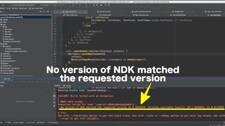Upgrade & Secure Your Future with DevOps, SRE, DevSecOps, MLOps!
We spend hours on Instagram and YouTube and waste money on coffee and fast food, but won’t spend 30 minutes a day learning skills to boost our careers.
Master in DevOps, SRE, DevSecOps & MLOps!
Learn from Guru Rajesh Kumar and double your salary in just one year.
The SHA1 key to integrate firebase in my flutter app.
After updating to Android Gradle plugin 3.6.0 (released Feb 24, 2020), several project independently started failing with: and i got this error
No version of NDK matched the requested version 20.0.5594570. Versions available locally: 21.0.6113669It’s quite simple to “fix” this locally by installing the older expected ndk version:
sdkmanager 'ndk;20.0.5594570'However, my question is: Where and how is this older version specified? And how do I update it so it matches the latest version 21.0.6113669?
After some Research I found the solution..
I am assuming the machine you are using currently has NDK installed and was previously able to build your project but started failing with the error “No version of NDK matched the requested version” after updating to Android Gradle plugin 3.6.0. Before proceeding make sure to have NDK installed Right ?
The First thing you need to try is
Option 1:
You can simply select your locally installed NDK in the Project Structure Dialog
You can open the Project Structure Dialog by clicking File > Project Structure... or by pressing the hotkeys CTRL + ALT + SHIFT + S (on windows)
Once the Project Structure Dialog is open, go to SDK Location and select your locally installed version of NDK under Android NDK Location. Typically this is installed somewhere in your user folder then \AppData\Local\Android\Sdk\ndk\%ndk version% at least for Windows.
Project Structure dialog screenshot – from Android Studio 3.6 Build #AI-192.7142.36.36.6200805, built on February 12, 2020
Or
Option 2:
Doing option 1 will edit your local.properties file for you and will work in most cases. But if you want to use a consistent NDK version on all machines you build the project with, according to this official guide, you can configure it from your module gradle script. Simply add the ndkVersion in your module gradle script’s android{} block like so.
android {
ndkVersion "major.minor.build"
}replacing the string between the double quotes with the NDK version you want to use

 Starting: 1st of Every Month
Starting: 1st of Every Month  +91 8409492687 |
+91 8409492687 |  Contact@DevOpsSchool.com
Contact@DevOpsSchool.com